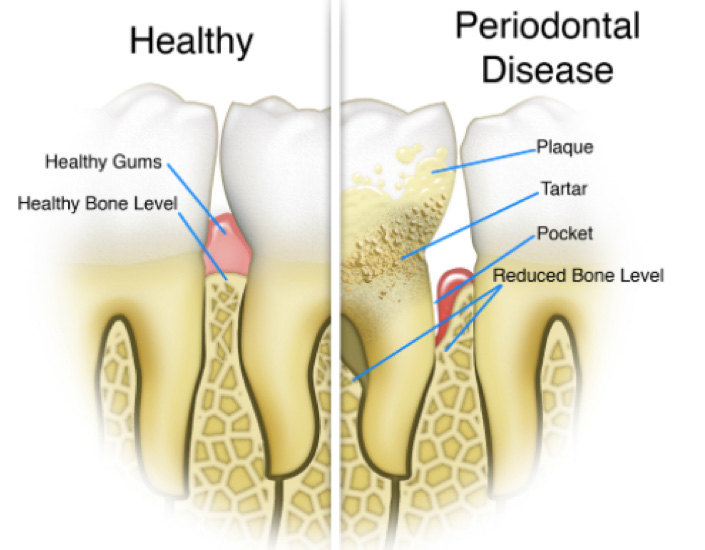Periodontal disease, also know as periodontitis and gum disease, is an inflammatory condition which affects the supporting and surrounding hard and soft tissues of the tooth and jawbone. Periodontal disease is primarily caused by dangerous bacteria in plaque that inflames the surrounding gum and resorbs surrounding bone of the affected tooth. Periodontitis is often preceded by gingivitis, which is a bacterial infection of the gum tissue. The bacterial infection releases toxins contained in the plaque, which start to irritate and inflame the gum tissues.
Factors that can influence the disease process are genetics, tobacco use, diabetes, stress, diet and poor oral hygiene. Periodontal disease is also associated other life threatening conditions such as cardiovascular disease, rheumatoid arthritis, diabetes and stroke.
Initial symptoms of periodontal disease are bleeding gums, bad breath, or there is also the possibility of no symptoms at all. Clinically during the dental exam, Dr. Misleh would see deepened pockets, bleeding during probing of the pockets and bone loss. If periodontitis is left untreated it can lead to loss of bone and loss of teeth.
There are many non-surgical and surgical treatments Dr. Misleh and his team can perform, or refer to a trusted periodontist for more advanced and specialized care. First a complete periodontal exam will be done to determine what treatment is necessary.
Potential treatments options can be:
- Scaling & root planning: In order to bring the gum tissue back to health, it is necessary to initially remove the bacteria and calculus (tartar), that initially caused the infection, from the tooth. The gum pockets will be cleaned and treated as necessary to promote healthy gingival reattachment.
- Tissue regeneration: Once bone and soft tissue have been destroyed by the inflammation & infection, a grafting procedure may be required in order to promote regrowth of bone and soft tissue. During this procedure, a membrane is placed in the affected areas to assist with guided tissue regeneration.
- Pocket elimination surgery: Also referred to as Flap surgery, is a surgical treatment option performed to reduce the pocket size.
